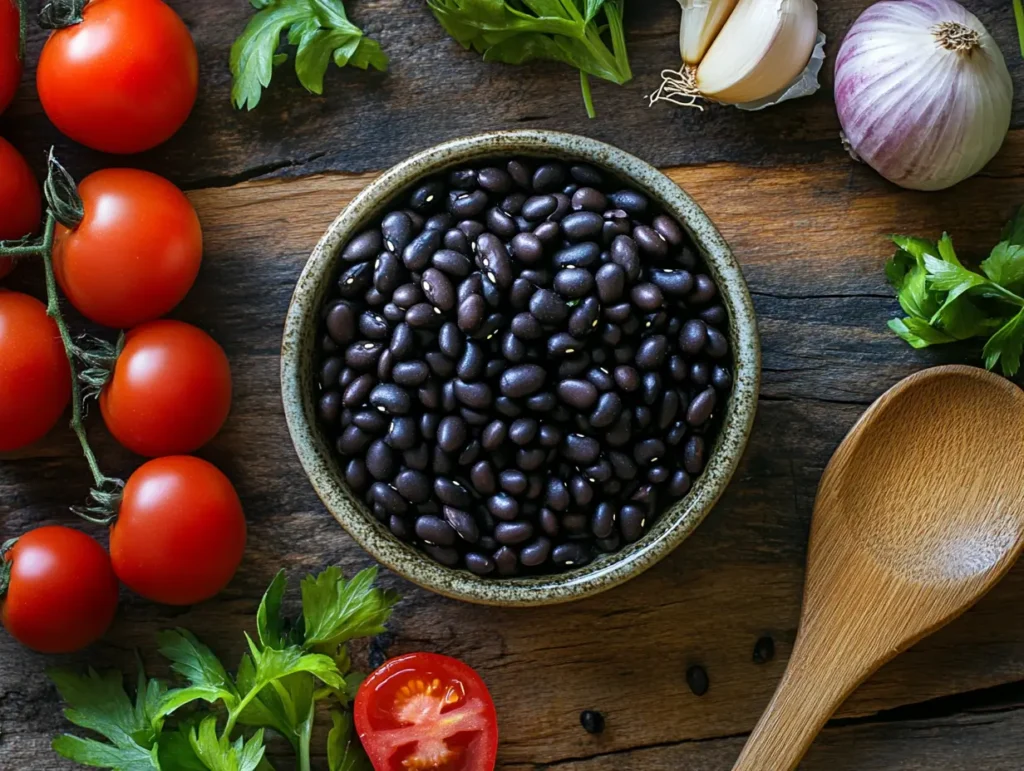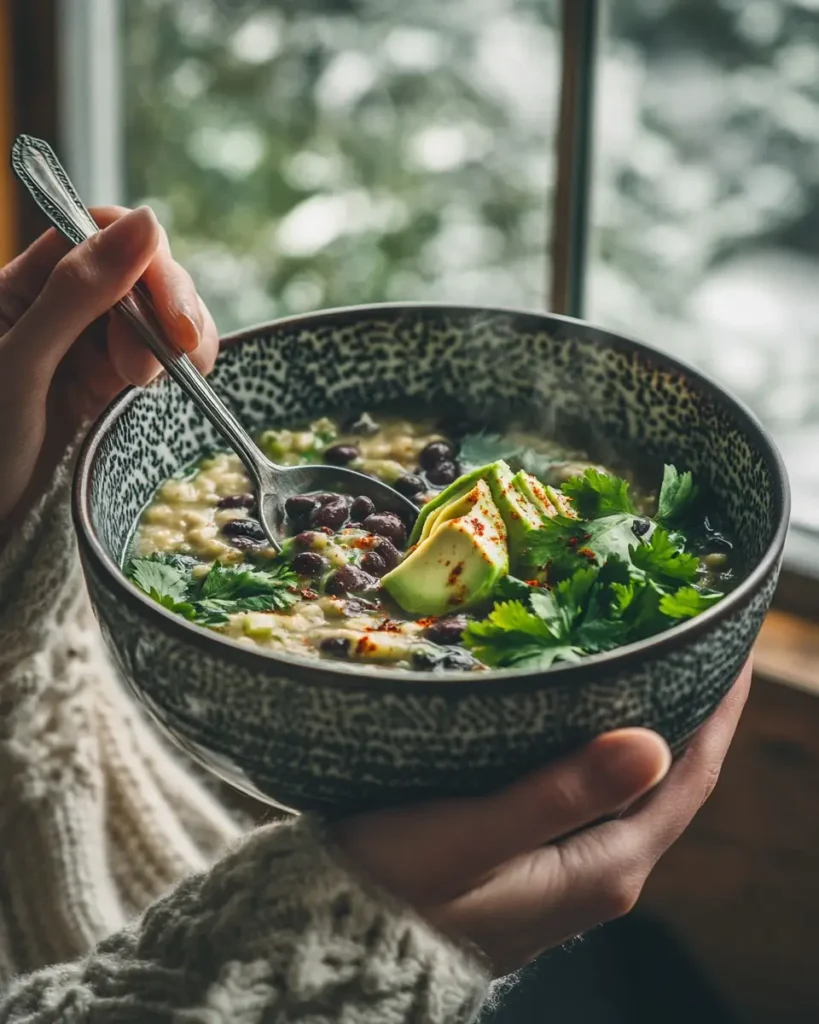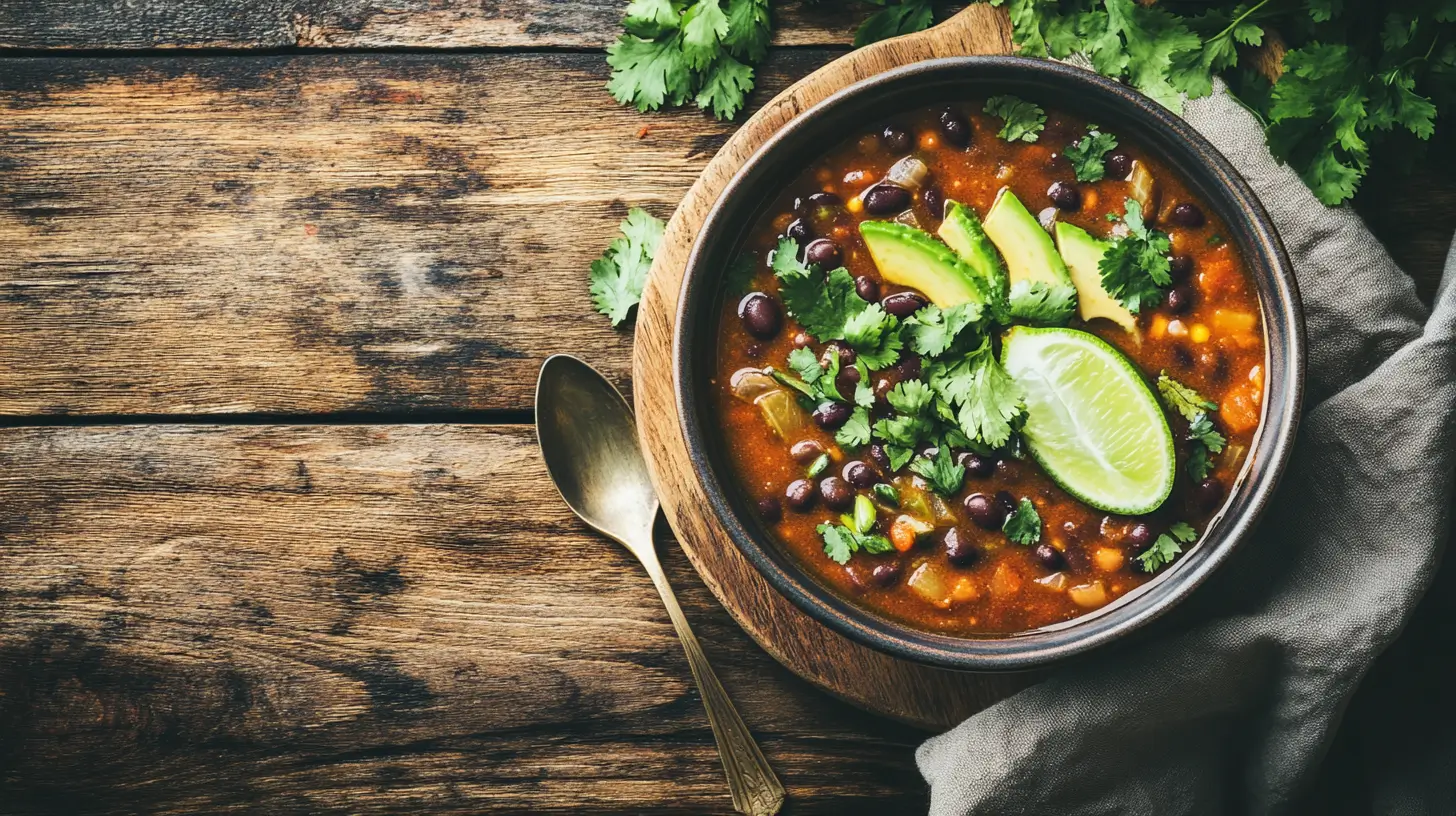Introduction
Black bean soup is not only delicious but also incredibly nutritious. You may wonder, “Is black bean soup good for you?” The answer is a resounding yes! This hearty dish is packed with protein, fiber, and essential vitamins that support heart health, digestion, and overall well-being. Whether you’re looking for a comforting meal or a health-boosting addition to your diet, black bean soup offers a perfect balance of flavor and nutrition.
Among the many dishes that feature black beans, black bean soup stands out as a nutritious and satisfying meal. This dish is loved not only for its comforting taste but also for its potential health benefits. It’s common to wonder: “Is black bean soup good for you?” The answer lies in its ability to combine flavor with nourishment, making it an ideal choice for various dietary needs.
In this article, we’ll explore everything you need to know about black beans, focusing on their nutritional profile, the benefits of black bean soup, potential risks, preparation tips, and recipe variations. Whether you’re a busy professional, a health-conscious parent, or a student looking for easy meal ideas, this comprehensive guide will show you why black bean soup deserves a spot on your weekly menu.
Is Black Bean Soup Good for You? The Nutritional Benefits You Should Know

Black beans are small, glossy legumes that are widely recognized for their distinctive dark color and mild, slightly sweet taste. Native to Latin America, they play an integral role in cuisines such as Mexican, Brazilian, and Cuban, where they are commonly paired with rice or featured in hearty soups and stews. Their rich flavor and dense texture make them a versatile ingredient in dishes ranging from burritos to salads, but they shine most brightly in black bean soup.
In addition to their culinary versatility, black beans have a long history of being valued for their nutritional content. Known for their high protein and fiber levels, they provide essential nutrients that support a healthy diet. The cultural significance of black beans cannot be overstated, as they are a staple in many traditional diets, reflecting their importance as an affordable and nutrient-rich food source.
If you’ve ever wondered why black beans are such a popular choice in health-conscious recipes, the answer lies in their ability to deliver both flavor and nutrition in a single serving. As we’ll see, their benefits extend far beyond their culinary appeal.
How Black Bean Soup Supports Your Health
Black beans are often celebrated as one of the most nutrient-dense legumes, making them a go-to ingredient for those looking to maintain a healthy and balanced diet. Here’s an in-depth look at what makes black beans so nutritionally valuable.
Macronutrients
Black beans are an excellent source of plant-based protein, providing about 15 grams of protein per cooked cup. This makes them a fantastic alternative to meat for vegetarians and vegans. Additionally, they contain 15 grams of fiber, which supports digestion and keeps you feeling full longer.
Vitamins and Minerals
Black beans are rich in essential vitamins such as folate, which is crucial for DNA synthesis and cell repair. They also contain significant amounts of magnesium, supporting muscle function and bone health, and iron, which is essential for oxygen transport in the blood. With high levels of potassium, black beans can help regulate blood pressure and balance electrolytes.
Low-Fat and Low-Calorie Content
A cup of cooked black beans contains only about 227 calories and is naturally low in fat, making it a smart choice for weight management and heart health.
Antioxidants and Resistant Starch
Black beans are loaded with antioxidants like flavonoids and saponins, which help combat oxidative stress. Additionally, they contain resistant starch, a type of carbohydrate that promotes gut health by feeding beneficial bacteria and stabilizing blood sugar levels.
These nutrients not only make black beans a nutritious choice but also contribute to the overall health benefits of black bean soup. Whether you’re aiming to boost your protein intake, support digestion, or improve overall health, black beans are a nutrient-rich option that delivers on all fronts.
Black Bean Soup for Heart Health and Cholesterol Control

Heart Health
Eating black bean soup regularly can have a profound impact on heart health. The high fiber content in black beans has been shown to lower LDL (bad) cholesterol levels, reducing the risk of plaque buildup in arteries. Furthermore, the potassium and magnesium found in black beans help regulate blood pressure, making black bean soup a heart-healthy addition to your diet.
Research indicates that diets rich in legumes like black beans can lower the risk of cardiovascular diseases. If you’re looking to improve your heart health naturally, a bowl of black bean soup is an excellent place to start.
Can Black Bean Soup Improve Digestion?
One of the standout features of black bean soup is its ability to support digestive health. Thanks to its high fiber content, black beans promote regular bowel movements and prevent constipation. Soluble fiber, in particular, forms a gel-like substance in the digestive tract, aiding in the smooth passage of food.
In addition to fiber, black beans contain resistant starch, which acts as a prebiotic. This type of starch feeds gut-friendly bacteria, enhancing overall gut health and supporting a balanced microbiome.
Is Black Bean Soup Good for Weight Loss?
This soup can be a valuable ally if you’re trying to shed a few pounds. The combination of protein and fiber in black beans helps keep you feeling full, reducing the likelihood of overeating. Moreover, it is relatively low in calories, allowing you to enjoy a satisfying meal without compromising your calorie goals.
For those looking to manage their weight without feeling deprived, this soup offers a flavorful and nutritious solution.
Black Bean Soup and Blood Sugar Management
Black beans are an excellent choice for individuals managing diabetes or those looking to stabilize blood sugar levels. With a low glycemic index, black beans cause a slow and steady release of glucose into the bloodstream. This prevents blood sugar spikes and supports long-term energy levels.
The resistant starch in black beans further enhances insulin sensitivity, making them a smart addition to a diabetes-friendly diet. A warm bowl of this soup is not only delicious but also a practical choice for maintaining stable blood sugar levels.
Immune System Support
The antioxidants found in black beans, including flavonoids and quercetin, play a vital role in boosting the immune system. These compounds help neutralize free radicals, reducing oxidative stress and inflammation. By incorporating this soup into your diet, you’re giving your immune system a well-deserved boost.
Anti-Inflammatory Properties
Chronic inflammation is a contributing factor to many diseases, including arthritis and heart disease. Black beans contain antioxidants that combat inflammation, supporting overall health and well-being. Regular consumption of this soup can help reduce inflammation naturally.
Potential Risks of Eating Black Beans
While black beans offer numerous health benefits, there are a few considerations to keep in mind.
- Anti-Nutrients: Black beans contain phytic acid, which can interfere with the absorption of certain minerals like iron and calcium. To mitigate this, soak black beans overnight before cooking.
- Gastrointestinal Discomfort: For some individuals, black beans may cause bloating or gas. Gradually introducing them into your diet and thoroughly rinsing canned beans can help minimize these effects.
- Sodium Content in Canned Beans: If you’re using canned black beans, opt for low-sodium varieties and rinse them well to reduce sodium levels.
By taking these simple precautions, you can enjoy the benefits of black beans without any drawbacks.
How to Make the Best Black Bean Soup for Your Diet
Making this soup is easy, and it allows for plenty of customization based on your preferences.
Preparing a Healthy, Low-Sodium Black Bean Soup Recipe
To begin, start by soaking dried black beans overnight, as this step significantly reduces cooking time and improves digestibility. Once the beans have soaked, be sure to drain and rinse them thoroughly to remove any excess starch or impurities. Next, cook the beans in fresh water for about 1–2 hours, or until they are tender and ready to use. By following these steps, you’ll ensure that your black beans are perfectly prepared for a variety of recipes.
Adding Superfoods to Black Bean Soup for Extra Nutrition
For a quicker option, use canned black beans. Be sure to rinse them thoroughly to remove excess sodium.
Basic Black Bean Soup Recipe
Ingredients:
- 2 cups cooked black beans
- 1 medium onion, chopped
- 2 garlic cloves, minced
- 4 cups vegetable broth
- Spices: cumin, chili powder, smoked paprika
Steps:
- Sauté onion and garlic until fragrant.
- Add black beans, broth, and spices.
- Simmer for 20 minutes.
- Blend partially for a creamy texture, or leave chunky if preferred.
Toppings like avocado, cilantro, and a squeeze of lime juice can take your soup to the next level.
Black Bean Soup Recipe Variations

Vegan Black Bean Soup
For a plant-based option, use vegetable broth and skip any dairy toppings. Adding diced tomatoes, bell peppers, or corn can enhance the flavor and nutritional value.
Spicy Black Bean Soup
Add jalapeños, cayenne pepper, and fresh lime juice for a zesty kick. A dollop of Greek yogurt or vegan sour cream can balance the heat.
Traditional Latin American Black Bean Soup
Season with bay leaves, oregano, and a splash of vinegar for an authentic Latin American flavor. Pair it with rice or plantains for a complete meal.
Complementary Dishes for Black Bean Soup
This soup pairs beautifully with a variety of side dishes. Consider these options:
- Protein Cornbread: This hearty side dish is perfect for soaking up the soup.
- Fresh Green Salad: Add a crisp and refreshing contrast to the warm soup.
- Rice or Quinoa: These grains make the meal more filling and balanced.
Comparisons with Other Soups
Black Bean Soup vs. Lentil Soup
While both soups are rich in fiber and protein, black bean soup offers a deeper and earthier flavor that many find hearty and satisfying. On the other hand, lentil soup is lighter and has a milder taste, making it a more delicate option. Additionally, lentil soup is typically faster and easier to prepare, making it an ideal choice for busy days. Ultimately, both soups are nutritious and flavorful, but they cater to slightly different preferences and occasions.
Black Bean Soup vs. Chickpea Soup
Black bean soup has a denser texture and a more robust, earthy flavor, whereas chickpea soup is milder with a subtly nutty undertone. Moreover, both soups are excellent plant-based options that provide essential nutrients and cater to a variety of dietary needs. Whether you’re in the mood for something hearty or prefer a lighter dish, these soups offer delicious and versatile choices for any meal plan.
Conclusion
This soup is a nutrient-packed dish that effortlessly combines flavor, versatility, and remarkable health benefits. Not only does it support heart health, but it also aids digestion and provides sustained energy, making it a valuable and reliable addition to any diet.
Furthermore, whether you prefer a spicy twist or a vegan-friendly version, this soup can easily be customized to suit your unique taste preferences. When paired with sides like Protein Cornbread, it transforms into a wholesome, satisfying meal that’s perfect for any occasion.
Now that you’re familiar with the many benefits of black bean soup, why not give it a try? Explore more by checking out our Black Bean Soup Recipe and other creative ideas on YUMA Recipes to get started today!
If you’re looking for creative ways to enjoy your perfectly cooked black beans, check out our Black Bean Soup Recipe for a hearty and nutritious meal idea. For plant-based alternatives, explore our Vegan Soup Dumplings or try the comforting flavors of our Easy Swamp Soup Recipe. By incorporating these ideas, you’ll add variety to your menu while making the most of this versatile ingredient.
FAQS
What are the Benefits of Black Bean Soup?
Black bean soup is a powerhouse of nutrition, offering numerous benefits for overall health. Here are some of the key advantages:
Supports Heart Health: The high fiber content helps reduce cholesterol levels, while potassium and magnesium help regulate blood pressure.
Aids Digestion: Its rich fiber and resistant starch promote gut health, regular bowel movements, and a balanced microbiome.
Boosts Immunity: Black beans are packed with antioxidants that combat free radicals and reduce inflammation.
Manages Blood Sugar: With a low glycemic index, black beans help maintain steady blood sugar levels, making them ideal for diabetics.
Weight Management: The combination of protein and fiber keeps you full for longer, reducing unnecessary snacking.
What Do Black Beans Do for Your Body?
Black beans provide essential nutrients that support various bodily functions:
Improve Muscle Function: Rich in magnesium and potassium, black beans support healthy muscles.
Enhance Digestion: Their high fiber content aids in regularity and prevents constipation.
Promote Healthy Bones: Calcium, phosphorus, and magnesium contribute to strong bones.
Boost Energy: Iron in black beans aids oxygen transport, improving overall energy levels.
Support Mental Health: Magnesium and folate have been linked to reduced symptoms of stress and depression.
Is It Healthy to Eat Bean Soup Every Day?
Yes, eating bean soup daily can be healthy, as it provides consistent protein, fiber, and vital nutrients. However, moderation is key:
Opt for low-sodium versions to manage salt intake.
Rotate with other legumes like lentils or chickpeas to diversify your nutrient sources.
Pair it with other foods like whole grains and vegetables for a balanced diet.
Do Black Beans Burn Belly Fat?
While black beans alone don’t directly burn belly fat, they significantly support weight loss in several important ways. Firstly, their high fiber and protein content helps increase satiety, meaning they keep you feeling full for longer and reduce the chances of overeating. Additionally, black beans help regulate blood sugar levels, which is crucial for preventing fat storage, especially around the belly area. Moreover, the resistant starch in black beans plays a vital role in boosting metabolism by improving insulin sensitivity and promoting better metabolic health.
When combined with regular exercise and a well-balanced diet, black beans become an excellent component of a belly-fat-reducing plan. By incorporating them into your meals, you’re not just enjoying a delicious ingredient, but also making strides toward a healthier lifestyle.

